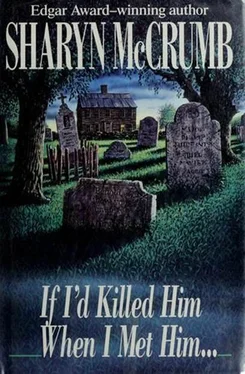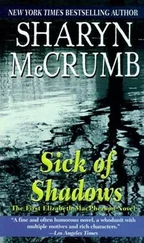“Was Tanya Faith ever alone with Chevry’s dinner box that evening?”
“I didn’t pay her any mind.” Donna Jean sniffed. “I was too busy working.”
“I sure wish you could remember details about that night, ma’am,” said Brower. “Because, you see, the fact is we got the autopsy report back, and it shows arsenic in your late husband’s system.”
“I didn’t poison him,” said Donna Jean. “He’d been saying that he felt poorly off and on for more than a week. Even Tanya Faith had a touch of it for a day or so.”
“And what about you, Mrs. Morgan? Did you ever feel sick?”
“No.”
“Well, there may be explanations we haven’t even thought of yet,” said Brower, standing up and shifting into his brisk mode. He talked faster when he wanted suspects to agree to something without thinking too much about his request. “We need to clear this up, though, Mrs. Morgan. You don’t want this business hanging over your head for who-knows-how-long. You know how people talk in a small town. If we don’t clear it up soon, you’ll be subjected to trial by bridge club.”
“Card playing is sinful,” murmured Donna Jean.
“So is gossip,” Brower agreed. “So I say let’s shut ’em down. If you’ll let Wade and me search the house now, and if you’ll show us how you made that dinner, that will go a long way toward clearing things up. I have a report to write, you know.”
It always amazed Brower that people didn’t tell him to go to hell right then and there. There was no way that he could legally impel a suspect to allow an informal search or to reenact part of a suspected crime, but most people didn’t seem to realize that. Maybe they were afraid that they’d look guilty if they refused, or maybe they thought he’d never find anything incriminating. Maybe they just didn’t want to inconvenience him. I have a report to write, you know . It was his best line, practically surefire. Sure enough, Donna Jean Morgan was smiling and nodding just like all the rest of the poor fools who had given Brower just about an inch too much rope.
But then, she said, “Certainly, Mr. Brower. I’ll just call my attorney, and if he says it’s all right, why, then you can do whatever you please.”
It was 5:04 P.M., and Margaret MacPherson was experiencing the familiar sensation of waiting for the emissary from the outside world. She remembered it well from her married life: she stayed home day after day, sending children to school, and a husband off to the city, while she waited in the tidy brick house, like a domestic Prisoner of Zenda, cooking and cleaning and waiting to hear about everyone else’s adventures that day. Because, of course, she hadn’t had any.
She thought she had left behind that existence, when she filed for divorce upon finding out about Doug’s pubescent bimbo, but now the feeling was back: the five o’clock vigil. She had busied herself all day with her photography, trying out new exposure times in the darkroom on some of the black-and-white portraits. She had even mopped the kitchen floor, because it needed doing, and she’d set some green beans and new potatoes on to cook, because she was home and Casey wasn’t. It wasn’t a division of labor or anything. She wasn’t a housewife anymore. She just happened to be home, so it seemed like the sensible thing to do.
At least she didn’t have to comb her hair and put on makeup anymore just because it was five P.M. Some things had changed, after all.
Phyllis Casey turned up at 5:30, slinging her briefcase onto the dining-room table with a groan. “If anyone wants to know what it was like in the Borgia court, they have only to ask me,” she declared, heading for the wine decanter.
“English faculty meeting?” Margaret guessed.
“What else?” Casey kicked her shoes off and sank down in the armchair across from Margaret. “I think we should put a metal detector at the door to the conference room, because, I swear, one of these days an untenured peon is going to kill Stanley Johnson. It may be me.”
“I know a good lawyer,” said Margaret, with a lazy smile.
“Actually, it wasn’t as bad as usual,” Casey said. “I think word of our party had got around. All through the meeting, Johnson kept eyeing me nervously, as if he expected me to jump up and spit tobacco juice into his coffee mug.”
“Yeah, you militant lesbians are dangerous, all right,” said Margaret solemnly.
Casey nodded. “It was very gratifying. We started discussing the teaching schedule for the fall term, and I spoke right up and said that I didn’t want to teach the Transcendentalist poets anymore. I wanted the James Joyce/D. H. Lawrence course. And I said that I wanted to add Virginia Woolf to the course for a feminist perspective on sexuality.”
“Good for you! How did they take it?”
Phyllis Casey laughed. “First, there was a charged silence in the room, as if everyone were thinking furiously at once, and then Dr. McClure started to wheeze, which means that he’d heard the rumors. And Johnson just nodded, and went on to the next item on the agenda. I couldn’t believe it, Margaret! After all these years of being well-spoken and polite, during which time they ran roughshod over me, and gave me the courses nobody else wanted, now suddenly I let it be known that I’m a lesbian, and they treat me like a conquering Visigoth. It was wonderful.”
Margaret MacPherson nodded happily. “My children are shocked into absolute silence. We should have thought of this years ago!”
“And the best part of it is, they just take your word for it!”
“Well,” said Margaret reasonably, “it’s not the sort of thing you can check up on, is it?”
Casey said, “Do you think I ought to buy some leather outfits, anyway? Just in case?”

ELEANOR ROYDEN’S EYES glittered at the unexpected novelty in an otherwise boring day of confinement. “So,” she said, sitting down at the conference table. “I get to spend an hour or so with you. This will be a nice change from Still Life with Bars. I hope you’re better than daytime television. I can’t say much for the decor, though.” She glanced appraisingly around the small, bare interview room. “Why does the criminal justice system have to paint everything beige? Maybe you ought to analyze them . I’d say it’s a symptom of repression-don’t they strike you as being rather anal-retentive-but then, you’re the expert.” She looked at him with an expression of sparkling expectation.
Exactly like the hostess at a cocktail party, thought the psychologist pityingly. I wonder if she has any notion of reality left?
“Well, enough about them,” said Eleanor, seeing that her opening gambit was not a success. “Let’s talk about you. You’re a psychologist! How fascinating! Have you done anybody famous?”
“Famous?” echoed the young man in his best Freudian manner.
“Well, perhaps notorious is the better word. You’re an expert witness in criminal psychology, so you must lead a pretty interesting life. Have you met Jeffrey Dahmer? James Earl Ray? A Menendez brother?”
Eric Stanfield’s face was impassive. He had been warned that Mrs. Royden was somewhat eccentric, and he had resolved not to be provoked by her behavior.
“Now listen to that,” Eleanor went on, without waiting for his reply. “I haven’t mentioned a single woman in that list of notorious murderers. Do you think women aren’t as well suited to spectacular crimes, or do we just not get enough press? In your professional opinion.”
Читать дальше













